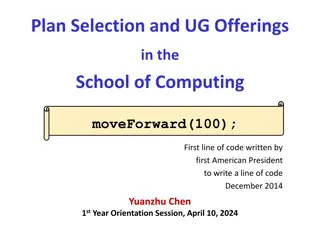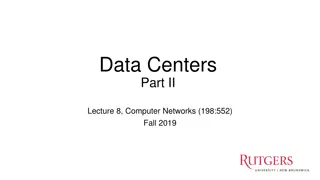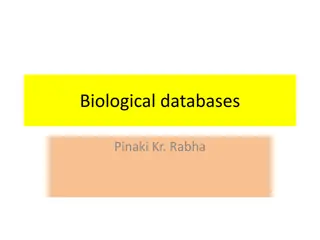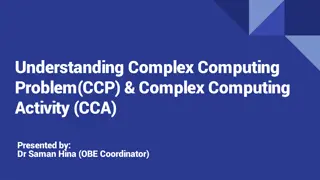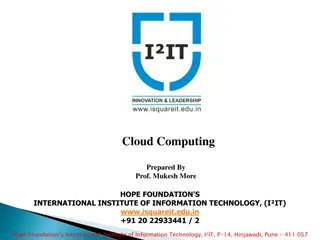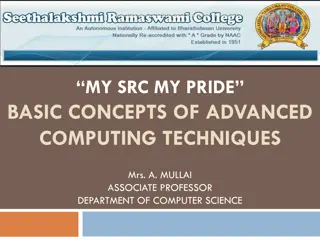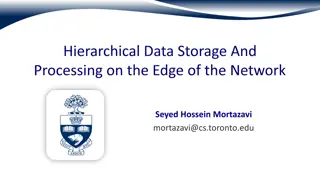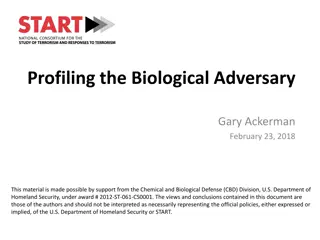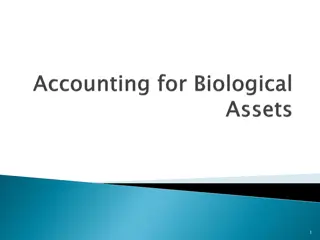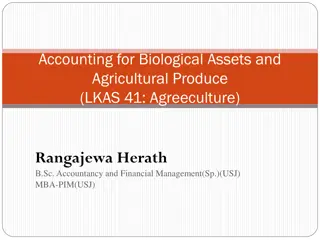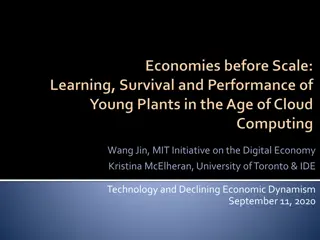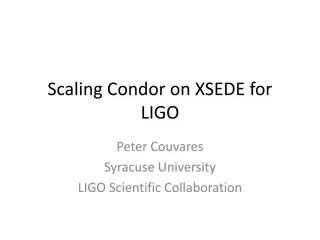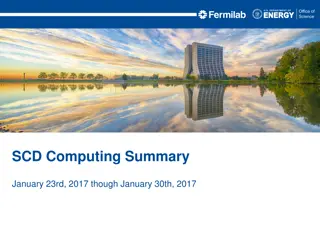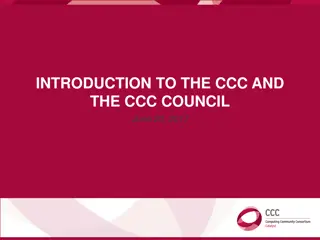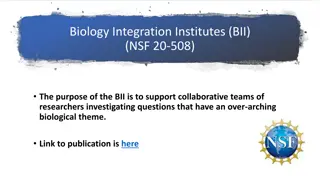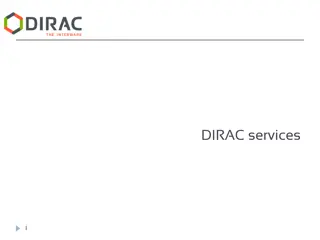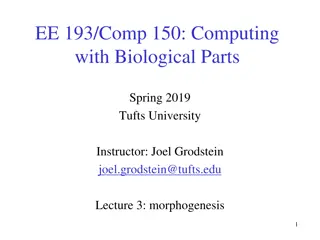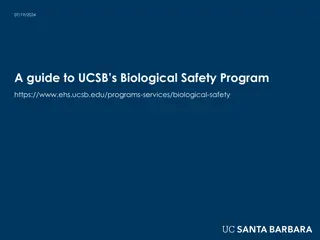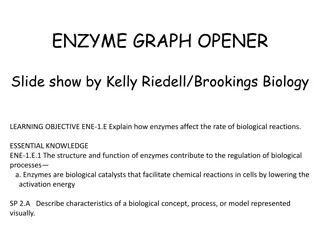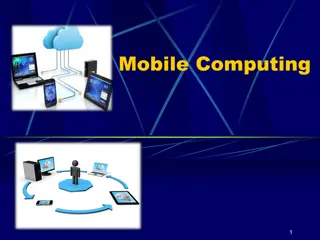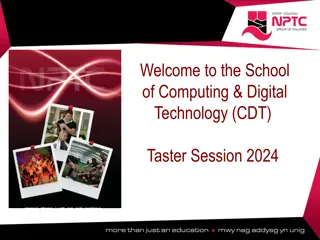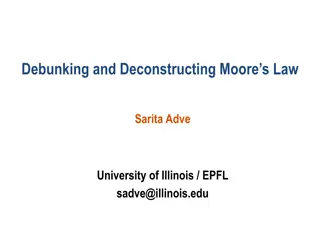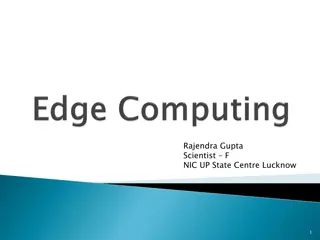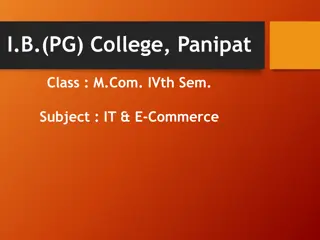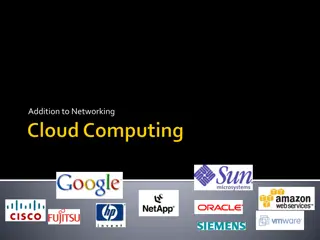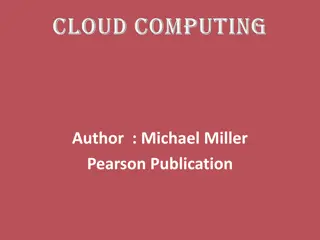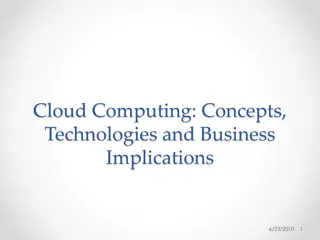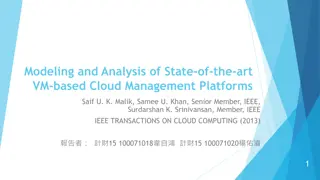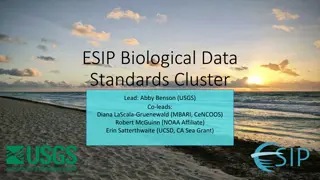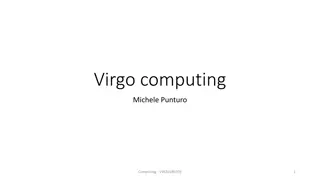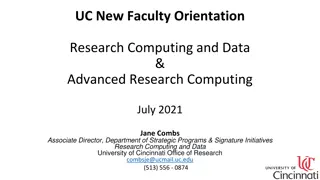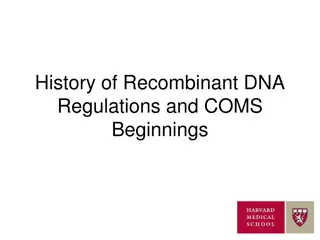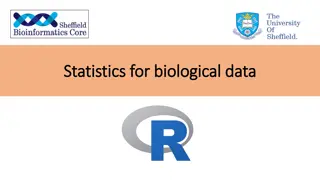Computing Degree Plans and Offerings at School of Computing
Explore the diverse degree plans and offerings at the School of Computing, including Honours and General degrees, minors, and certificates in Data Analytics. Plan selection is crucial for advancing to second-year courses, with automatic acceptance and pending list options available. Discover the var
0 views • 20 slides
Understanding Data Centers and Cloud Computing Technologies
Explore the world of data centers and cloud computing through topics such as data center functionalities, cloud computing advantages, challenges in Data-Center Networks (DCNs), cost breakdowns, server utilization considerations, and more. Delve into the intricacies of managing large-scale computing
0 views • 20 slides
Understanding Parallel and Distributed Computing Systems
In parallel computing, processing elements collaborate to solve problems, while distributed systems appear as a single coherent system to users, made up of independent computers. Contemporary computing systems like mobile devices, IoT devices, and high-end gaming computers incorporate parallel and d
1 views • 11 slides
An Overview of Biological Databases in Bioinformatics
Biological databases play a crucial role in bioinformatics, storing vast amounts of data related to nucleotide sequences, protein sequences, and more. These databases are publicly accessible and essential for research in biological fields. Primary databases, such as GenBank, EMBL, and DDBJ, contain
0 views • 13 slides
Understanding Complex Computing Problem (CCP) and Complex Computing Activity (CCA)
Dr. Saman Hina, along with Dr. Farrukh Arif and Dr. Maria Waqas, presents information on Complex Computing Problem (CCP) - a problem involving technical, computing, and other issues with no obvious solution, requiring deep knowledge and analytical thinking. CCP is evaluated through predefined rubric
4 views • 19 slides
Understanding Cloud Computing and Its Components
Cloud computing, offered by the Hope Foundation's International Institute of Information Technology, is Internet-based computing that involves remote servers sharing data-processing tasks and resources. Users can access software without local hardware requirements, empowering them with agility and e
0 views • 15 slides
Exploring Basic Concepts of Advanced Computing Techniques
Delve into the world of advanced computing techniques with Mrs. A. Mullai as she discusses networks, computing, and pervasive (ubiquitous) computing. Discover how networks facilitate data exchange, the role of computing in designing hardware and software systems, and the trend of embedding computati
2 views • 40 slides
Exploring Emerging Technologies in Cloud Computing
Cloud computing revolutionizes accessibility to computing resources through shared pools. Next-generation applications, edge computing, and web applications on the cloud are shaping the future. CloudPath offers a platform for executing third-party applications across distributed data centers. Real-w
0 views • 16 slides
Understanding Cloud Computing, Edge Computing, and Their Applications
Cloud computing entails centralized processing of data on powerful servers, offering scalable resources over the internet. Edge computing brings processing closer to data generation points, reducing latency and enhancing security. Both paradigms cater to different needs such as IoT, autonomous vehic
0 views • 18 slides
Understanding Biological Adversaries: Education Levels and Demographics
Exploring the traits of biological adversaries, this study reveals that perpetrators with higher education levels are more likely to successfully use chemical and biological agents. Success tends to increase with age and years of activity. Most individual perpetrators originate from the MENA region,
0 views • 16 slides
Exploring Orto-Computing: Bridging the Gap Between Formal and Phenomenological Computing
Meaningful experiments suggest a transition from the formal, Turing-based approach to a structural-phenomenological one called Orto-Computing. This innovative concept integrates mind-matter interaction and non-formal functions within computational systems, offering potential solutions to complexity
0 views • 18 slides
Accounting for Biological Assets and Agricultural Produce
At the end of this lesson, you will be able to identify the principal issues in accounting for biological assets and agricultural produce at the time of harvest. Topics include the recognition, measurement, presentation, and disclosure of biological assets in financial statements. Questions regardin
0 views • 26 slides
Accounting for Biological Assets and Agricultural Produce (LKAS 41: Agriculture) by Rangajewa Herath
This content provides insights into the accounting standards for biological assets and agricultural produce under LKAS 41, discussing classification, presentation, measurement, gain or loss recognition, and disclosure requirements. It covers the unique nature of biological assets, the scope of LKAS
0 views • 20 slides
Impact of Cloud Computing Technology on Young Firms' Performance
The technology shock of cloud computing has significantly influenced the survival and performance of young firms. Young firms face higher uncertainty, benefit from experimentation, and are resource-constrained, making cloud computing's elastic, fast, and generic nature particularly advantageous. Thi
0 views • 21 slides
Scaling Condor on XSEDE for LIGO - Collaborative Computing Project
The project aims to evaluate the utilization of XSEDE resources by LIGO for large-scale computing tasks, with a focus on distributed computing challenges and fostering a research computing community. Various aspects such as political, cultural, and technical narratives surrounding the collaboration
0 views • 28 slides
Summary of SCD Computing Metrics and Scientific Computing for January 23rd - January 30th, 2017
This summary covers a range of topics related to scientific computing metrics and SCD computing services from January 23rd to January 30th, 2017. It includes details on service areas, offerings, job operations, resource provisioning, database management, system monitoring, and more. The summary also
0 views • 5 slides
Reexamining the Biological Race Debate by Quayshawn Spencer
Quayshawn Spencer reexamines the biological race debate, discussing the onto-semantic strategy, its problems, and applications to public health genomics. The philosophical foundations of biological racial anti-realism are critiqued, exploring the concept of race through historical perspectives like
0 views • 37 slides
Overview of the Computing Community Consortium
The Computing Community Consortium (CCC) was established in 2006 under the Computing Research Association (CRA) to develop a vision for computing research and communicate it to stakeholders. It aims to align computing research with national priorities, encourage high-impact research, and groom new l
0 views • 48 slides
Biology Integration Institutes (BII) - NSF Research Opportunity
Supporting collaborative teams of researchers exploring overarching biological themes, the Biology Integration Institutes (BII) provide a framework for integrated research in diverse biological disciplines. This initiative enables design and development activities, with potential for significant fun
0 views • 10 slides
Advanced Cloud Computing Solutions with DIRAC Services
Explore advanced cloud computing solutions offered by DIRAC services at IN2P3, including maintenance, operation, VM scheduling, and contextualization. Learn about dynamic VM spawning, cloud endpoint abstraction, and virtual machine monitoring for efficient resource allocation. Stay updated on the la
0 views • 15 slides
Introduction to Mobile Computing Principles and Designing Mobile Applications
Mobile computing systems involve computing capabilities that can be utilized while on the move, leveraging wireless connectivity, small size, and mobile-specific functionalities. The history of mobile computing traces back to military origins and has evolved with technologies like GPS and wireless t
0 views • 98 slides
Introduction to Boston University's Shared Computing Cluster
Boston University's Shared Computing Cluster (SCC) provides researchers with access to a high-performance computing environment for running code, collaborating on shared data, and utilizing specialized software packages. With over 800 nodes, 20,000 processors, and hundreds of GPUs, the SCC offers re
0 views • 63 slides
Exploring Morphogenesis and Regenerative Medicine in Computing with Biological Parts
This course delves into the intriguing world of morphogenesis, focusing on how cells express proteins based on their environment and the potential applications in regenerative medicine. Through studying animals' abilities, hypothesizing algorithms, and exploring bioelectricity, the course aims to un
0 views • 49 slides
Guide to UCSB Biological Safety Program
This guide provides an overview of UCSB's Biological Safety Program, covering important aspects such as lab safety fundamentals, biological use authorization, biosafety officer's role, and the Institutional Biosafety Committee. It outlines key steps like hazard assessment, training, waste management
0 views • 24 slides
Enzymes in Biological Reactions: Understanding Activation Energy
Enzymes, as biological catalysts, play a crucial role in regulating biological processes by lowering the activation energy required for chemical reactions in cells. The addition of enzymes changes the overall energy dynamics of reactions, impacting the rate at which products are formed. This interac
0 views • 7 slides
Overview of Task Computing in Parallel and Distributed Systems
Task computing in parallel and distributed systems involves organizing applications into a collection of tasks that can be executed in a remote environment. Tasks are individual units of code that produce output files and may require input files for execution. Middleware operations coordinate task e
0 views • 17 slides
Exploring the World of Mobile Computing
Delve into the realm of mobile computing through this comprehensive presentation outline. Discover what mobile computing is, its applications, challenges, and the future of this technology. Compare mobile networks to wired networks, understand why going mobile is essential, and explore various types
0 views • 106 slides
Explore Computing and Digital Technology Courses at CDT
Discover a range of courses offered by the School of Computing & Digital Technology (CDT) in 4 different colleges. From A-Level Computing to Level 3 Extended National Diploma in IT, the programs provide a blend of theoretical knowledge and practical skills to prepare students for various career path
0 views • 12 slides
Exploring the Evolution and Future of Computing: Moore's Law Debunked
Dive into the critical analysis of Moore's Law and Dennard Scaling by Sarita Adve from the University of Illinois, uncovering the shift towards a new era focused on doing more with less in computing hardware and software abstraction. Discover the concept of "Less Law of Computing" and the emphasis o
0 views • 7 slides
Understanding Edge Computing for Optimizing Internet Devices
Edge computing brings computing closer to the data source, minimizing communication distances between client and server for reduced latency and bandwidth usage. Distributed in device nodes, edge computing optimizes processing in smart devices instead of centralized cloud environments, enhancing data
0 views • 32 slides
Understanding Cloud Computing in IT & E-Commerce for M.Com IVth Sem Students at I.B. PG College, Panipat
Cloud computing is a revolutionary internet-based computing model that provides shared resources, software, and information on demand. This paradigm shift allows users to access services without the need for expertise in technology infrastructure, offering benefits like scalability, cost-efficiency,
0 views • 16 slides
Exploring Cloud Computing: Key Concepts and Considerations
Cloud computing is a network-based computing model that offers on-demand services over the Internet, providing scalability, flexibility, and cost-efficiency for businesses. This article delves into the definition, services, and potential risks associated with cloud computing, emphasizing the importa
0 views • 10 slides
Introduction to Cloud Computing: A Comprehensive Overview
Cloud computing, a transformative technology, enables easy access to applications and data from anywhere in the world, promoting collaboration and efficiency. This chapter delves into the fundamentals of cloud computing, distinguishing it from traditional desktop computing and network computing. Und
0 views • 32 slides
Overview of Cloud Computing Technologies and Business Implications
Explore the concepts, technologies, and business implications of cloud computing through a discussion on multi-core processors, virtualization, cloud service models (IaaS, PaaS, SaaS), data processing models like MapReduce, and real-world case studies. Learn about the evolution of internet computing
0 views • 18 slides
State-of-the-art Analysis of VM-based Cloud Management Platforms
This study delves into the modeling and analysis of cutting-edge VM-based cloud management platforms, exploring topics such as cloud computing, cloud structure, types of cloud computing, key features of cloud computing, and examples from the cloud computing industry. It discusses Infrastructure as a
0 views • 40 slides
Advancing Biological Data Standards for Marine Research
Discussion on biological data standards for marine research, challenges faced, existing standards, and the need for guidance and community building. Goals include maximizing data relevance for biodiversity studies. Ongoing work involves developing a primer for data managers unfamiliar with biologica
0 views • 7 slides
Overview of Virgo Computing Activities
Virgo computing has been a hot topic recently, with various discussions and meetings focusing on computing issues, future developments in astroparticle computing, and funding for INFN experiments. The activities include presentations, committee meetings, talks, and challenges in computing faced by V
0 views • 34 slides
Research Computing and Data Services at University of Cincinnati
Research Computing and Data (RCD) at the University of Cincinnati provides digital research infrastructure services to faculty, research staff, and students. They offer support for research projects, data management, analysis, visualization, and collaboration, along with access to high-performance c
0 views • 13 slides
Understanding COMS and Recombinant DNA Regulations
The Committee on Microbiological Safety (COMS) was established in 1978 to address public concerns regarding safety, environment, and ethics of research involving hazardous biological agents. COMS oversees activities related to recombinant DNA and biological agents at Harvard, supporting all schools
0 views • 6 slides
Understanding Statistics for Biological Data in Courses
Dive into the world of statistics for biological data through a comprehensive course led by experienced instructors at the University of Sheffield. Explore the fundamentals of statistics, research questions, hypotheses, and hypothesis testing related to biological inquiries. Gain insights into organ
0 views • 14 slides
